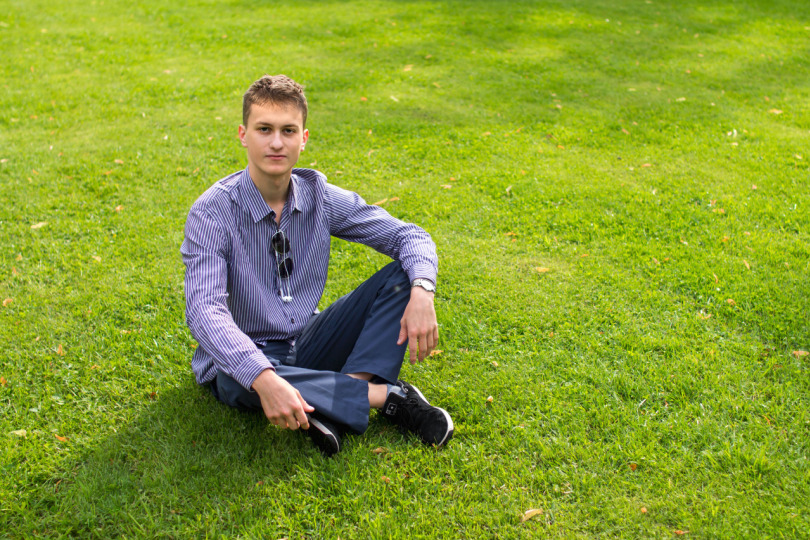‘HSE Gives Knowledge and the Chance to Use it’

— Tell us about your business Kirill, what do you actually do?
— I manage Netball web studio which I founded about a year ago. It’s a new but promising studio: in the space of a year we’ve gained a good reputation among respected organisations like Sportmaster, Veterany Voennoi Kontrazvedki (Veterans of Military Counterintelligence) and others.
It all started with designing small sites on our courses, and now people come to us with the most unlikely ideas which we bring to life, for example, we recently launched in beta testing a service for three-dimensional navigation inside a building.
— Where can we read more about it?
— On our website you can read about all the systems and projects we’ve designed.
— How did it all begin? Was it difficult to manage the business and study at the same time?
— We set up the company last summer with a team of talented designers in different cities in Russia, Ukraine, Belarus, India and Poland. With every project we became more and more ambitious. Good work doesn’t go unnoticed and old clients brought us new ones. Now we have to go to other cities to work on public transport and go for days without sleep but the results make it all worthwhile. It’s not easy to combine such a heavy workload with studying but it is certainly possible. I should say that the university let me bend the rules on more than one occasion.
— How far back does your interest in this area go?
— To my school days, I think. I went to the specialist Mathematics and Physics School No. 444 where we submerged ourselves in computer programming. But in those days I didn’t plan to devote myself to IT, I decided later, at HSE. University showed me how fascinating it could be.
In my third year at HSE I started working as a digital business analyst in Sportmaster’s central office where I made useful contacts and improved my organisational skills. Now I work with Sportmaster on behalf of Netball. We recently completed a project for an HRM system with an innovational interface which has further strengthened our reputation.
— Tell us about what you learned at HSE...
— When I left school I had offers at the Bauman University, the Moscow Engineering Physics Institute and at HSE, and after a visit to the Business Informatics Faculty (now the Faculty of Business and Management) I understood that I wanted to spend the next six years of my life there. HSE introduced me to lots of interesting people and gave me a huge amount of useful and relevant information which is particularly valuable as far as contemporary education is concerned. In the third year of the degree course there were specialist subjects and free time. I managed to spend 3-4 days in the office and work on designs for our first websites. I won the Electronic Business students and alumni contest at the end of my degree course and was offered a place on the Master’s programme.
— Why did you chose Electronic Business?
— While I was doing my Bachelor’s I had the chance to try out working on business analytics, business process modelling, web design, information systems projects developing sites, search optimisation and other kinds of work-related activities.
So I knew what I was doing when I chose the Electronic Business programme because I understood the ways I needed to develop to be able to put my knowledge and experience into practice.
— Are you happy with your choice?
— Yes. The programme has given me a broad spectre of relevant knowledge and enough free time to apply it. Electronic Business is the best Master’s I could have chosen, as far as I’m concerned.
— How useful has the knowledge you gained from studying been in your business?
— I think that what you learn in higher education shouldn’t be practical skills. I was pleasantly surprised by how up to date the subjects were on the Master’s: IT is a rapidly developing area where lots of important technologies change over the course of a year and in 2 or 3 the field is completely transformed. The best thing a university can do for students under these circumstances is to teach them how to think and be analytical. HSE provides those skills to the full.
— What would you highlight in the teaching at HSE?
— Mainly being allowed to take part in research conferences. Besides the annual inter-university events, HSE helps you go to conferences at an international level. In 2014, for example, I was lucky enough to represent HSE and RIPE NCC at the EuroDIG conference in the German Ministry of Foreign Affairs in Berlin. And I went to several other useful events.
The teachers do all kinds of things to help develop students and their sense of initiative. Through Michael Komarov’s efforts the Faculty organised a competition for the best internet magazine, created as a course-work project, and for the best mobile phone app, and there were a large number of guest lectures given by famous research and business professionals. HSE gives you knowledge and the chance to use it.
— The results of the competition for aspirantura (PhD equivalent) portfolios were announced on 1st July and you were among the winners. Congratulations! What made you decide to go for it?
— Thanks! I think that science and practice need to be interconnected - we actively apply new technology and the results of new research in our studio and pave the way for new investigations.
The Master’s degree provided me with lots of useful opportunities and valuable ideas and I’m sure that the aspirantura (PhD equivalent) will be no less fruitful. Besides, I’m glad to still be a part of the big HSE family.
Interview by Khatuna Abashidze, Manager at the Faculty of Business and Management.
